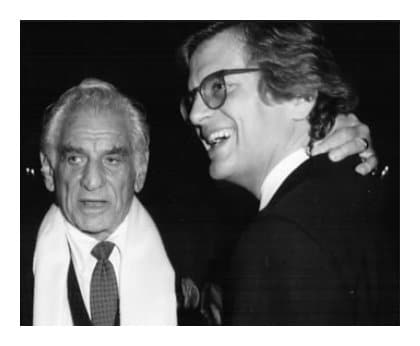Beethoven pal’s diary is found in Paris trash can
NewsA notebook belonging to the Czech composer Anton Reicha, a lifelong friend of Beethoven’s from their days as orchestra players in Bonn, has turned up in a Paris street among a pile of garbage that was waiting for collection.
A woman passed by and picked it up. Ownership has been claimed by the Moravian museum and the notebook is now on display in a Reicha exhibition.






Whaaaat…
How the hell did it get there? Any ideas?
I’d bet that someone put it there.
I don’t know how the notebook got there but I know how it could happen. Ever have to clean up and close out – in short order – the house of a deceased relative? Or try to “help” with an intervention of a genuine hoarder and it is a race against time before the hoarder starts to bring the stuff back in the house?
You are in a huge hurry and the task looks insurmountable. Speed is everything. If you have specialized knowledge about something – say, antique furniture or rare stamps or military medals – perhaps you are in a position to put some particular thing aside. But you know you are just throwing away things “of value” — even coins and paper money — but have no alternative because there is no time.
An old notebook, perhaps in a language a person does not understand, amid a mountain of similar clutter — I can see how it can happen. I suspect rare books, rare manuscripts (including music), genuine art works, all manner of precious items, have met similar fates for similar reasons. And having been in the position of the cleaner-outer, I don’t cast much blame on them.
I agree that Reicha is an important name and it is good that a discerning person rescued the notebook. Three cheers for dumpster divers!
Why isn’t the headline “Reicha’s diary found in Paris trash can”? Why drag in Beethoven? There is a problem if the #1 classical music news site can’t trust its users to have heard of Reicha, who was quite a considerable composer in his own right, and a very important teacher of composition?
And is this news? The discovery must have been some time ago, if the diary is now in the Moravian Museum.
Is there evidence for a life-long friendship with Beethoven? I get the impression it sort of petered out in the 1800s.
More information, please!
On a monday November evening while it was raining heavily in Vienna, Reicha discovered that Beethoven stole all of his best ideas. In fact, ALL of Beethoven’s 9 symphonies are based upon Reicha’s 9 symphonies, whole passages literally copied, just with added dynamics and trombones. A shocked Reicha saw for instance that sonata opus 111 had been entirely copied from his own opus 111. In a time without copyright, Reicha got angry, confronted B with his discovery, but got as an answer: ‘I do it so much better than you so keep your mouth shut and don’t tell anybody’. This was all related in the diaries, and music lovers who bought the book always destroyed it after reading.
NOT that sort of information!
I’m going to have to start hunting through garbage now.
Reicha was a Bohemian composer and not a Czech composer.
Same thing. Reicha’s native language was Czech.
I thought that Czechoslowakia did not exist around 1800 so also Czech did not exist.
State did not, nation did. So did Slovakians – but it was all, among Austrians, Hungarians, etc. included in Austro-Hungarian Empire.
Yes, so the Bohemians simply spoke Bohemian. Who would like to have it otherwise?
In the Czech language “Bohemian” and “Czech” have the same meaning (České). The Czech for “Kingdom of Bohemia” is České království.
Anton Reicha ran away from his neglectful widowed mother in Prague, aged about 10, and was adopted by his uncle Josef Reicha, the principal cellist in the Wallenstein court. It was then that Anton learnt German and French. Josef was later (1785) appointed Kapellmeister at Bonn, where Anton and Ludwig van Beethoven became close friends, both the same age and both with positions in the court orchestra, flute and viola respectively. (Thanks mainly to Wikipedia)
Great story. Reicha was an interesting composer:
https://www.youtube.com/watch?v=PcqZT7hjxMk
https://www.dailymotion.com/video/x3f4674
https://www.youtube.com/watch?v=_nn5MPL0yyg
The close friendship was in Reicha’s imagination – looked good in his autobiography. Lots of proof to the contrary.
Just because “Reicha’s native language was Czech” doesn’t necessarily make him Czech. Otherwise Americans would be English.
More seriously, the idea that language = national identity is something that was created during the 19th century and only really became widespread as a way ordinary people thought of themselves in Bohemia in the late 19th century. Reicha came before that time, and it is anachronistic to describe him as “Czech”.
“…in Paris trashcan” — somehow this is piquant.
If it had been “London,” the
effect of the headline would not have been quite the same. Sympathies to David
K. Nelson.
This sounds a bit like the oldfashioned British sense that Paris functioned as a drain for all the unwanted elements of British society, seeking refuge from victorian censorship, to indulge in their decadence undisturbed.
I explored quite some music by Reicha today on the internet to get a better idea of his music. But I have to conclude that it is gynaecologist music: he knows everything but the emotional function of all of that somehow escapes him. It is academic in nature.
https://www.youtube.com/watch?v=eZk6QQasAq8
https://www.youtube.com/watch?v=_nn5MPL0yyg
https://www.youtube.com/watch?v=PcqZT7hjxMk
If you compare that with a ‘minor’ work by Beethoven, also in an ‘academic form’, a piece which he not even deemed important enough to give it an opus number, then you get immediately where the difference lies and it is not talent but personality:
https://www.youtube.com/watch?v=U-qdxKyR9PU
Well spotted. And moreover, he was employed at the Paris Conservatoire as teacher of harmony and counterpoint. NEVER composition.